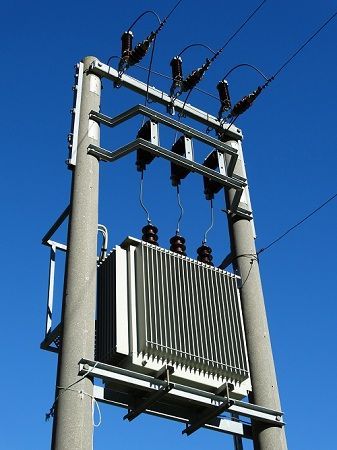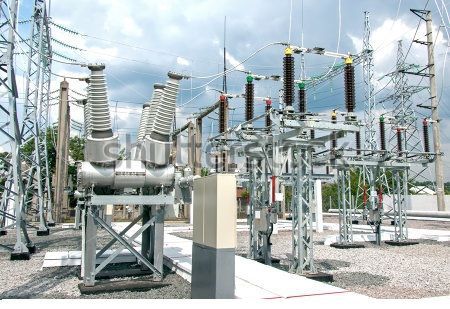A substation which is used for all voltage levels between 55 KV to 765 KV is called outdoor substation. Such type of substation requires less time for construction but uses more space. The outdoor substations are mainly classified into two types, namely pole-mounted substation and foundation-mounted substations.
Pole Mounted Substation
Such substations are used for supporting distribution transformers having the capacity up to 250 KVA. Such types of transformers are the cheapest, simplest, and smallest of distributions. All the equipment is the outdoor type and mounted on the supporting structures of high tension distribution line. Triple pole mechanically operated switch used for switching on and off the high tension transmission line.
HT fuse is used for protection of the high tension transmission line. For controlling the low tension lines, low tension switches along with fuses is equipped. Lightning arresters are equipped over the high tension line for the protection of the transformers from the surges. Pole-Mounted substations are earthed at two or more places.

The transformers having a capacity up to 125 KVA are mounted on the double pole structure and for the transformer having a capacity between 125 to 250 KVA 4-pole structure with the suitable platform is used. Such types of the substation are placed in very thickly populated location.
Their maintenance cost is low, and by using a large number of the substation in a town, it is desirable to lay the distributors at a lower cost. But when the number of transformers is increasing, total KVA is increased, no load losses in increases and the cost per KVA increases.
Foundation Mounted Substation
In foundation mounted substation all the equipment area assembled and the substations are embedded by the fence for safety purpose. The equipment required for such type of substations are heavy, and hence the site selected for such type of substation must have a good path for heavy transport. Foundation mounted outdoor substation is shown in the figure below.

Advantages of Outdoor Substation
The outdoor substations have the following main advantages. These are
- All the equipment in the outdoor substations is within view, and therefore fault location is easier.
- The expansion of the installation is easier in the outdoor substations.
- The time requires in the construction of such substations is lesser.
- The smaller amount of building material like steel, concrete is required.
- The construction work required is comparatively less, and the cost of the switchgear installation is also very low.
- Repairing work is easy, and proper space is provided between the apparatus so that the fault occur at one point will not be carried over to another point.
Disadvantages of Outdoor Substation
- More space is required for the outdoor substations.
- Protection devices are required to be installed for the protection against lightning surges.
- The length of the control cables increases which increase the cost of the substation.
- Equipment designed for outdoor substation are more costly because outdoor door substation equipment required additional protection from the dirt and dust.
In spite of the disadvantage, outdoor substations are very widely used in the power system.

Hi,
My name is Natan, and I’m a student of Electrical Engineering here in Brazil.
I’m doing a final College project which I’ve read one of your articles here on Circuit Globe.
The article is “What is Outdoor Substation”
I really like your article.
Thank you so much.
Regards,
Nei Natan.